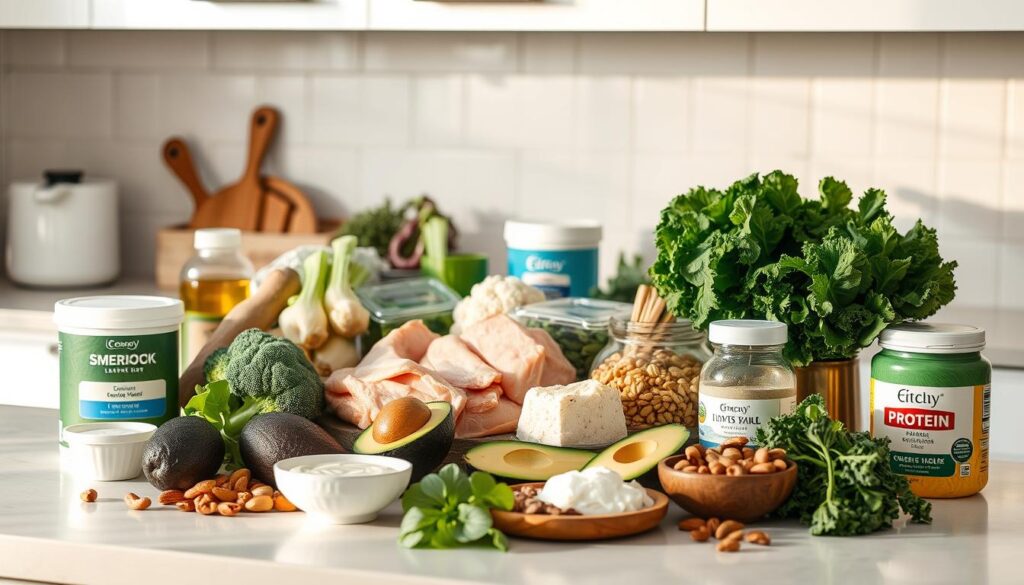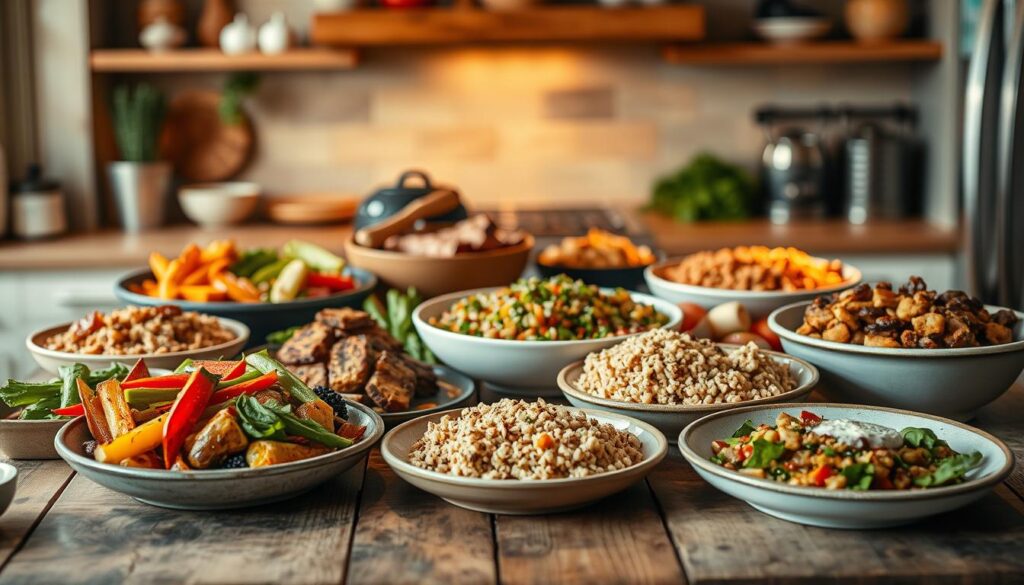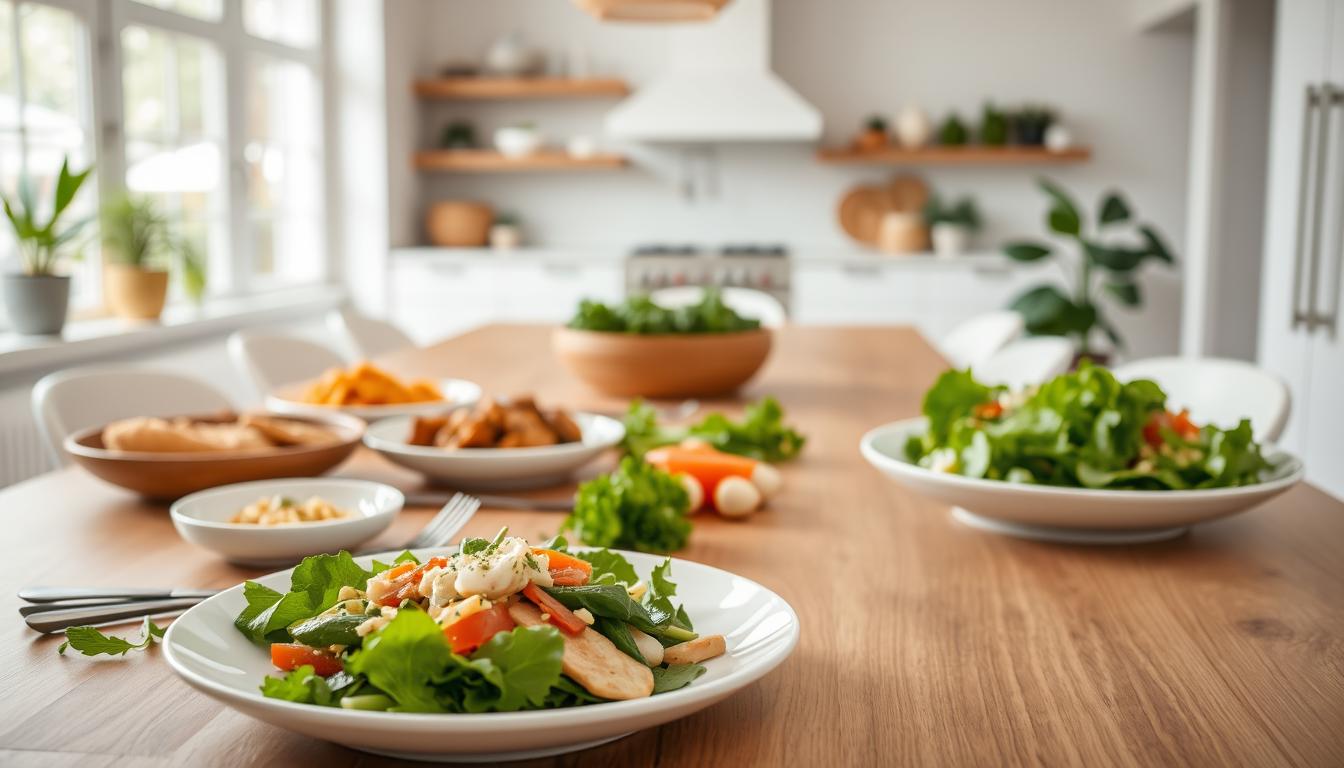Your weight loss journey starts with surgery, but it’s just the beginning. Transforming your diet with bariatric recipes makes meal prep exciting. It’s a journey of health and flavor.
Post-surgery nutrition might seem tough, but these recipes make recovery enjoyable and nourishing. Each bite supports your body’s healing and delights your taste buds.
The first weeks after surgery need careful meal planning. Your diet will start with clear liquids and move to soft foods. Remember, portion control is key, using tablespoons instead of cups.
Protein is a key player in your recipes. Eat 3 high-protein meals a day and have protein shakes for healing. The goal is to make meals nutritious and delicious, proving healthy eating doesn’t mean giving up flavor.
This guide will help you through every stage of your culinary journey. You’ll get practical tips, tasty recipes, and the support you need for successful post-surgery nutrition.
Table of Contents
Understanding Bariatric Nutrition
After bariatric surgery, finding the right food can be tough. It’s key for your health and losing weight. You need to plan your meals carefully to help your body heal.
Why Nutrition Matters After Surgery
Your stomach gets much smaller after surgery. So, every meal is important. You’ll focus on low-calorie foods to get the nutrients you need and help with weight loss.
- Prevents nutrient deficiencies
- Supports healing and recovery
- Maintains muscle mass during weight loss
- Ensures sustainable health improvements
Key Nutrients to Focus On
After surgery, you need to pick your nutrients wisely. Protein is the most important for keeping muscle and helping you recover.
| Nutrient | Daily Recommended Intake | Best Sources |
|---|---|---|
| Protein | 60-75 grams | Chicken, fish, Greek yogurt |
| Fluids | 64 ounces | Water, herbal tea |
| Vitamins | Multivitamin supplement | Bariatric-specific multivitamins |
Eat small, nutrient-rich meals and drink plenty of water. Your meal plan should focus on quality over quantity. This way, you get the most nutrition with the least amount of food.
Essential Ingredients for Bariatric Cooking
After bariatric surgery, making healthy meals is key. You need to pick ingredients that help you heal and taste great. These should be high in protein and support your health.

Knowing the right ingredients is important. Each one helps with your recovery and keeps you healthy in the long run.
Lean Proteins for Healing
Protein is vital for healing after surgery. You need about 60-80 grams a day. This helps fix tissues and keep muscles strong.
- Chicken breast (3 ounces provides 25 grams of protein)
- Fish varieties like salmon and tilapia
- Low-fat dairy products
- Greek yogurt (10 grams of protein per serving)
Whole Grains and Fiber-Rich Foods
Whole grains and fiber are good for your digestive health. They also give you energy that lasts.
- Quinoa
- Brown rice
- Oatmeal
- Zucchini (2 grams of fiber per serving)
Healthy Fats: What to Include
Healthy fats are important for absorbing nutrients and staying well. They’re key in your bariatric diet.
| Fat Source | Benefits | Serving Size |
|---|---|---|
| Avocado | Heart-healthy monounsaturated fats | 1/4 medium avocado |
| Olive Oil | Anti-inflammatory properties | 1 tablespoon |
| Nuts | Protein and omega-3 fatty acids | 1 ounce |
Choosing the right ingredients lets you make tasty, healthy meals. These meals support your recovery and help you reach your health goals.
Creative Meal Prep Strategies
After bariatric surgery, finding the right nutrition can be tough. But, with smart meal prep, you can succeed. It’s all about planning and knowing what your body needs.
First, understand what you need after surgery. Your goal is to make tasty, healthy meals that are just the right size.
Batch Cooking for Convenience
Batch cooking is a big help for bariatric patients. It saves time and keeps your diet consistent all week.
- Prepare proteins in bulk: Grill chicken, bake turkey meatballs
- Roast vegetables for quick side dishes
- Portion meals into individual containers
- Store meals in refrigerator for 3-4 days maximum
Portion Control Hacks
It’s key to control your portions after surgery. These tips will help you eat right without eating too much.
| Portion Control Technique | Benefit |
|---|---|
| Use 7-9 inch plates | Naturally limits portion sizes |
| Fill half plate with vegetables | Ensures nutrient diversity |
| Measure protein portions | Maintains recommended 60-80g daily intake |
| Use small containers for meal prep | Prevents accidental overeating |
Good meal prep is about making healthy habits that last. With these tips, meal prep will become a positive part of your life.
Flavorful Bariatric-Friendly Recipes
Starting your post-surgery diet doesn’t mean you have to give up taste or fun. These recipes are made to keep your meals tasty, healthy, and just right for your body. You’ll find easy bariatric diet ideas that make eating a joy.

Savory Breakfast Options
Start your day with protein-rich breakfasts that help with weight loss. Here are some tasty choices:
- Low-Carb Spinach and Cheese Omelette (gluten-free and bariatric-friendly)
- Vanilla Oat-Flour Protein Pancakes
- High-Protein Deviled Eggs with Greek yogurt
Nutritious Lunch Ideas
Midday meals should be light but filling. These recipes offer the perfect mix:
- Skewers of Grilled Chicken and Vegetables Served with Tzatziki Sauce
- Turkey Meatballs with Zucchini Noodles (2 servings, 25 minutes prep)
- High-Protein Chicken and Vegetable Puree
Delightful Dinner Dishes
Evening meals can be tasty and healthy with these ideas:
- Bariatric-Friendly Turkey Meatloaf (4 servings, 15 minutes prep, 45 minutes cook)
- Sweet Potato Turkey Chili packed with lean protein
- Baked Ricotta with Spinach and Herbs
Satisfying Snacks and Desserts
Enjoy treats that are good for you:
- Banana Pudding Parfait with Greek Yogurt
- Spiced Carrot and Lentil Puree
- Herbal teas like Cinnamon Fenugreek or Turmeric Ginger Tonic
These recipes are made to give you the nutrients you need while making meals fun and tasty. Your post-surgery diet can be both enjoyable and healthy.
Cooking Techniques for Better Digestion
After bariatric surgery, how you prepare your meals is key for nutrition and comfort. Choosing the right cooking techniques is vital. They help in making healthy weight loss and gastric bypass diet recipes better. Your digestive system needs gentle, nutrient-preserving methods that cut down on fats and focus on food quality.
Your post-surgery meal prep should aim for easy digestion and better nutrient absorption. Different cooking methods offer unique benefits for bariatric patients.
Steaming: The Nutrient Preserver
Steaming is a top choice for bariatric patients. This method:
- Keeps nutrients at their best
- Needs little added fat
- Makes food tender and easy to digest
- Is great for veggies and lean proteins
Baking: A Healthier Alternative
Baking is another great option for healthy meals. It uses little oil and lets natural flavors shine. This way, you can make tasty gastric bypass diet recipes without losing nutritional value.
Sautéing and Grilling: Adding Flavor Safely
Sautéing and grilling add great flavors to your meals while keeping them nutritious. Here are some tips:
- Use non-stick pans to cut down oil
- Choose lean proteins like chicken or fish
- Keep cooking temperatures moderate
- Cut ingredients into small, easy-to-digest pieces
Remember, your post-surgery cooking should focus on gentle methods. These support your healing and nutritional needs.
Incorporating Seasonal Ingredients
Using seasonal produce makes bariatric meal planning fun. It brings out the best flavors and gives you the most nutrients for your recipes.

Choosing the right produce is key. Your body needs foods that help with healing and managing weight after surgery. Seasonal ingredients can turn your recipes into nutritional powerhouses.
Smart Produce Selection Strategies
- Choose fruits and vegetables with vibrant colors
- Look for locally grown options at farmers markets
- Check for firm, unblemished produce without soft spots
- Prioritize organic options when possible
Seasonal Recipe Inspiration
Every season brings new ingredients for your meals. Summer offers light foods like zucchini and tomatoes. Winter brings warm veggies like butternut squash and Brussels sprouts.
Nutrition-Packed Seasonal Choices
- Spring: Asparagus, peas, spinach
- Summer: Berries, tomatoes, cucumber
- Fall: Pumpkin, sweet potatoes, kale
- Winter: Citrus fruits, root vegetables
Adding seasonal ingredients to your meals makes them diverse and nutritious. Focus on protein and keep portions small as you enjoy these seasonal delights.
Adapting Family Recipes for Bariatric Needs
After bariatric surgery, you need to change how you make family meals. You can keep your favorite recipes but make them healthier. This way, they support your health journey.
To make family favorites into bariatric recipes, you need to make smart changes. You’ll use different ingredients and adjust the amounts. This keeps the taste good while making the meals healthier.
Smart Recipe Modification Strategies
- Replace high-fat meats with lean protein sources like chicken or fish
- Use Greek yogurt instead of full-fat sour cream or mayonnaise
- Swap refined grains for whole grain alternatives
- Reduce portion sizes using smaller plates
- Increase vegetable content to boost nutritional density
Involving Family in Healthy Cooking
Make changing recipes a family activity. This can help everyone understand and support your health goals. Cooking together can be fun and educational.
The American Society for Metabolic and Bariatric Surgery says planning meals is key. By getting your family involved, you’re not just changing recipes. You’re also creating a healthier eating environment for everyone.
Protein-Packed Recipe Transformation Tips
- Add protein powder to baked goods
- Incorporate cottage cheese into casseroles
- Use nutritional yeast for cheesy flavor with added protein
- Choose high-protein flour alternatives
With a little creativity and family help, your bariatric recipes can be tasty and healthy. This way, you can enjoy your favorite dishes while staying on track with your health goals.
Staying Motivated with Your Meal Plan
Maintaining motivation is key to successful bariatric-friendly meal planning. Your weight loss journey needs consistent effort and smart strategies. These help you stay engaged and committed to your healthy lifestyle goals.

Creating a Supportive Meal Environment
Turn your kitchen into a powerful tool for healthy weight loss recipes. Start by:
- Removing tempting processed foods
- Stocking nutrient-dense ingredients
- Preparing meal prep containers
- Organizing your refrigerator for easy access to healthy options
Tracking Your Progress Effectively
Monitoring your nutritional intake helps keep you motivated. It ensures you meet key dietary requirements. Consider these tracking strategies:
| Tracking Method | Benefits |
|---|---|
| Food Diary | Record daily intake, protein consumption, and emotional relationship with food |
| Smartphone Apps | Digital tracking with automatic nutritional calculations |
| Weekly Weight Check | Visualize progress and adjust meal plans |
Your success in bariatric-friendly meal planning depends on consistent tracking and celebrating small victories. Remember to document your protein intake, aiming for 60-75 grams daily. Also, stay hydrated with at least 64 ounces of fluids.
Professional support groups can boost your motivation. Consider joining local bariatric support communities or online forums. There, you can share experiences and get encouragement from others on similar journeys.
Overcoming Common Challenges
Life after bariatric surgery is a journey of resilience and planning. It’s not just about losing weight. It’s about finding a lasting way to eat well and stay healthy.
Bariatric surgery patients face special challenges that can slow them down. Knowing these challenges is key to keeping on track with healthy eating and staying well.
Dealing with Cravings After Surgery
Cravings can be strong after weight loss surgery. Studies show that up to 30% of patients face tough nutrition challenges and tempting foods. Here are ways to fight hunger:
- Choose nutrient-dense, high-protein bariatric dishes that satisfy hunger
- Keep healthy snacks readily available
- Practice mindful eating techniques
- Stay hydrated to reduce false hunger signals
Avoiding Unhealthy Triggers
Emotional and environmental triggers can mess with your diet goals. Mental health issues affect 30-50% of bariatric surgery patients. It’s vital to manage these triggers.
- Identify personal food triggers
- Create a supportive home environment
- Develop stress-management techniques
- Seek professional counseling if needed
By using these strategies, you’ll grow stronger and stay true to a healthier lifestyle. Focus on thoughtful eating and being aware of your needs.
Resources for Further Learning
Your journey with bariatric recipes doesn’t end here. It’s important to keep learning and finding support. Many resources can guide you, offering expert advice and tasty recipes.
Specialized cookbooks and online platforms are great for bariatric patients. Sites like Bariatric Foodie and Skinnytaste have lots of protein-rich recipes. Apps like Baritastic and MyFitnessPal help track nutrients, ensuring you get enough protein and control portions.
Online support groups are also key. Facebook groups and Reddit’s r/BariatricSurgery connect you with others facing similar challenges. They share recipes, experiences, and offer emotional support, which is vital during your journey.
Keep learning and staying connected to succeed. Check out cookbooks, join forums, and explore nutrition. Your dedication to learning about bariatric-friendly cooking will help you make healthy, tasty meals. These meals will support your health goals and improve your life quality.

